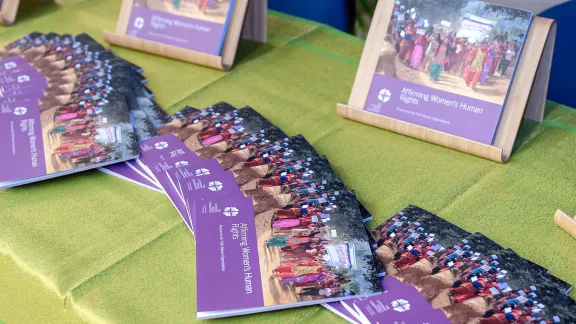
Past, present and future Lutheran women in leadership discuss challenges and progress in breaking barriers to affirm womenâs rights and equality. Photo: LWF/S.Gallay
International Women’s Day webinar explores successes and obstacles for past, present and future generations
(LWI) - What can be done to break down barriers that prevent women from fulfilling their potential and reaching top leadership positions in the church and in society? That question was at the heart of a webinar hosted by the Lutheran World Federation (LWF) on 8 March, International Women’s Day, featuring five women leaders from the global communion’s past, present and future.
Among key solutions that the panelists proposed were investing strongly in girls’ education, tackling unconscious bias, deepening feminist theological reflection, creating strong support networks, and working to end all kinds of sexual and gender-based violence. Only by working together with women and men across generations, they agreed, will it be possible to move towards full gender equality.
Representing the past generation of leaders was Dr Musimbi Kanyoro from Kenya, a former head of the LWF office known for many years as WICAS (Women in Church and Society) and recently retired president of the Global Fund for Women. She recalled the opportunities she had, in the 1980s, to meet with women in LWF member churches around the world. She saw how many of them were excluded from meaningful participation and leadership roles.
Standing on firm foundations
But Kanyoro also recalled the progress made as many churches began ordaining the first female pastors and introducing required quotas of women in leadership. "Staying close to Scripture and opening spaces for dialogue,” are vital ways of moving forward, she said, since “we know that we are created equal to serve God.” Her words echoed those of LWF’s General Secretary Rev. Dr. Martin Junge who, in opening remarks, said: “God has made us equal. As such, [.…] we are called to live, serve and witness in church and society [….] Let this deep conviction of faith continue nurturing our relationships and our vision.”
Two current leaders at the LWF Communion Office shared reflections on their own career paths, paying tribute to the role models whose examples inspired them. Ms Maria Immonen, director of the Department for World Service recalled the legacy of her grandmother, a committed women’s rights advocate, and her mother, one of the first women ordained in the Evangelical Lutheran Church of Finland. Standing on such “a strong foundation” was important for her, she said, but also finding an opportunity to pursue further studies in leadership and management.
Ms Eva Christina Nilsson, director of the Department for Theology, Mission and Justice also expressed gratitude to be “walking in the footsteps of others” who have helped to break down barriers over past decades. She recalled her experience as the first woman and first lay person to head the Swedish Mission Council, noting that organizers of events often assumed she was “an accompanying spouse,” rather than the Council’s general secretary. Even today, Nilsson noted, women in member churches continue to face barriers to their participation in leadership at all levels. “You can never lean back, never sit down,” she insisted, adding that LWF staff “are here to support you.”
Challenges for young leaders
Far away from the Communion Office in Geneva, Ms Adriana Franco Chitanana shared her experience as head of the LWF’s World Service country program in Colombia. Growing up in a Peruvian-American family, she said, there was “a lot of inequality” and a “patriarchal tone” which made her want to achieve more and “earn my place” at the table. Reaching out to other women and forming support networks, including through social media groups, she explained, has been very “helpful to discuss intimate and internal topics” such as sexual harassment and violence.
Representing a generation of future leaders, Ms Kuei Juliana Martha from South Sudan spoke of her opportunity to join a mentorship program in LWF, allowing her to work as an intern, before being tapped to head a COVID-19 response team in her country. She became involved in many different aspects of LWF work, describing it as a “conducive environment” to learn about gender justice. But she also noted the “recurring conflicts in South Sudan,” alongside problems of poverty, insecurity and early marriage for girls, making it “really hard for young leaders” like herself.
Commenting on the structural barriers that continue to hamper women’s progress in the church, Nilsson lamented the patriarchal traditions that persist, despite the fact that “there is no biblical foundation for inequality.” Some churches have established quotas for the participation of women and young people, but, she added, “we cheat ourselves if we are satisfied with quotas and need to go beyond to a culture of mutual respect.”
We cheat ourselves if we are satisfied with quotas and [we] need to go beyond to a culture of mutual respect.
Nilsson and Kanyoro reflected on the misuse of power and privilege, noting the need for greater self-awareness and “hard work on unconscious bias which keeps people in their own place.” It is vital for women to “stand in solidarity” and “learn from each other,” respecting a variety of different opinions, they said. Women “need to come with our similarities and also with our differences, as these make us better and richer,” Kanyoro added.
Immonen reiterated “the need to invest in the education of women,” as well as providing safe and secure environments and “a balanced workforce” at all levels. “The ultimate goal of gender justice,” she stressed, “is for both men and women to be comfortable in themselves” therefore it is vital to evaluate and appreciate the “different leadership styles” that individuals can bring.
The current LWF leaders concluded by paying tribute to young women like Kuei who “are making their voices heard,” despite the many challenges they face at this time of COVID-19. All generations of women must stand together, they said, in order to “work with that hope which does not disappoint.”
LWF/P. Hitchen


